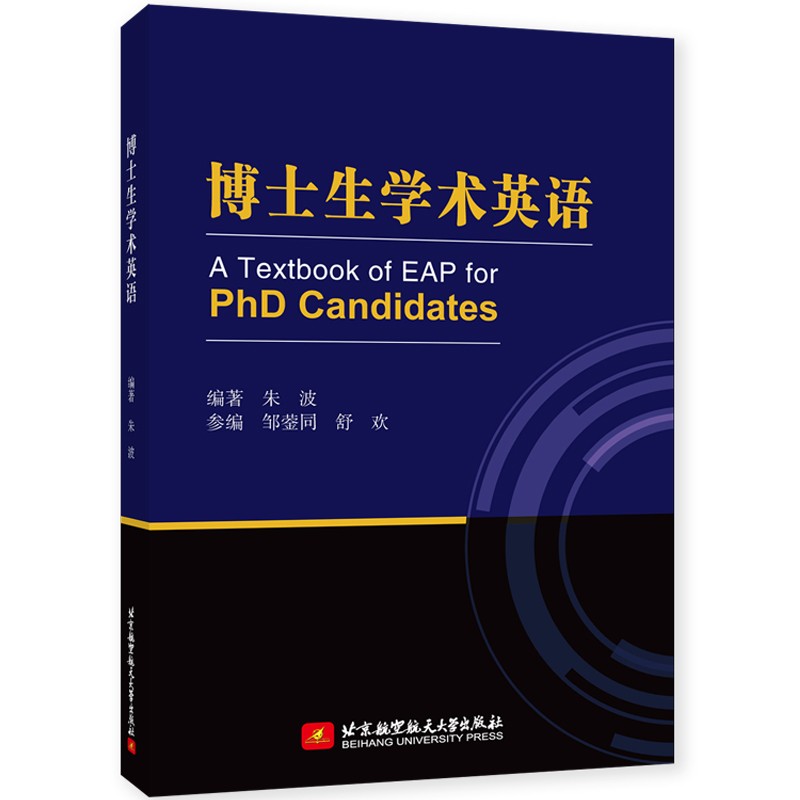- ISBN:9787512435445
- 装帧:一般胶版纸
- 册数:暂无
- 重量:暂无
- 开本:16开
- 页数:252
- 出版时间:2021-07-01
- 条形码:9787512435445 ; 978-7-5124-3544-5
内容简介
本书是南京航空航天大学外国语学院研究生公共外语教学部的代表性成果。课题组跨越学科边界,扣紧博士生培养过程,在研讨基础上选取16个关键词,作为单元主题。从品质英文学术刊物上选文,分别用作Text A,Text B,和Further Reading。Text A后附有注释,Text B后附有思考题,Further Reading后配有填词练习题。每个单元都专门设计了写作练习和后继研究话题,做到编研一体,彰显内容的结构化和精致化。此外,每单元都有简介,发挥导读功能。教材具有主题性、思辨性、系统性等特点,潜移默化,立德树人,旨在培养具有优选视野和世界眼光的
目录
Unit 1 Career
Text A Moving the goalposts in graduate education
Text B Uncertain futures
Unit 2 Conference
Text A The highs and lows of scientific conferences
Text B How to design an award-winning poster?
Unit 3 Co-supervision
Text A What is co-supervision?
Text B Co-supervision in doctoral education: challenges and responses
Unit 4 Critical Thinking
Text A The virtue of critical thinking
Text B Critical thinking and science education
Unit 5 Data
Text A When all science becomes data science
Text B Who’s looking at your data?
Unit 6 Degree
Text A The nature of doctoral education
Text B Originality and the PhD
Unit 7 Grant
Text A Secrets to writing a winning grant
Text B After the fall: what to do when your grant is rejected
Unit 8 Impact Factor
Text A Citation data: the wrong impact?
Text B Impact factors and their significance: overated or misused?
Unit 9 Industrial PhD
Text A Outside the box
Text B How to successfully collaborate with industry?
Unit 10 Interdisciplinary Studies
Text A How to catalyze collaboration
Text B Break out
Unit 11 Misconduct
Text A Is science facing a reproducibility crisis?
Text B Academic misconduct disciplinary policy
Unit 12 Open Access
Text A In pursuit of open science,open access is not enough
Text B Plan S:the ambitious initiative to end the reign of paywalls
Unit 13 Peer Review
Text A Peering into peer review
Text B It’s time to lift the veil on peer review
Unit 14 Publication
Text A Writing the manuscript successfully
Text B Riding out rejection
Unit 15 Seminar
Text A The secrets of a standout seminar
Text B What do we mean by seminar?
Unit 16 Viva
Text A Levelling the playing field: towards best practice in viva
Text B Preparing doctoral candidates for the viva
节选
"Whoever invented the meeting must have had Hollywood in mind. I think they should consider giving Oscars for meetings: Best Meeting of the Year,Best Supporting Meeting, Best Meeting Based on Material from Another Meeting. "Well,I don't want to give out Oscars-think about those interminable,maudlin acceptance speeches-but when the Editors of Nature Revie-cvs Molecular Cell Biology asked me to write an essay on "the highs and lows of scientific conferences",I was reminded of Goldman's remark. It seemed to me that rather than a head-to-head comparison of specific conferences-which is hard to do comprehensively from personal experience alone,and might have unfortunate consequences-it made more sense to examine the main characteristics of scientific conferences and to offer some perspectives,from 30 years' experience of sitting through good meetings and bad,on what distinguishes the successful ones from the ones that make "home sweet home" seem much more than a cliche.So,in what follows,I present,semi-seriously,a set of observations and suggestions that are organized into categories for which I propose to award,notOscars,but Georges. I chose this name based on my friend George Kenyon,whoserecord of more than 20 consecutive years of attendance at the same annual meeting-the Gordon Research Conference4 on Enzymes,Coenzymes and Metabolic Pathways-might have been broken subsequently,but I suspect not if you include the criterion that the person setting the record must be sane at the end.Big versus little conferences?I've been to meetings with as few as ten people-each of whom presented,of course-and I've been to meetings with many thousands of scientists. I like them both,but for different reasons,and I have different approaches to attending them.Small meetings,such as workshops,offer the opportunity to get to know people well. They allow a subject to be explored in depth. It's easy to initiate collaborations at small meetings. What they don't necessarily allow are many opportunities,if any,to sneak off 6 and shop,sleep or just hang out. So it's very important for tiny meetings to schedule such times,because everybody needs them.Unfortunately,small meetings are most often the ones that don't do this. They also tend to be inbred,sometimes to the point of intellectual incestr. If I were to organize a small meeting,I'd try to have at least one or two talks on subjects a bit outside the topic in question,so that at least some attendees would come from neighboring fields. Such people have to be chosen with care,and their personality would matter as much as the subject,but I think we'd all learn more this way.The biggest of the big conferences is the Neuroscience Annual Meeting,which now has either 50 thousand or 50 billion attendees,I forget which. This is not a meeting. It's a small country. I mean,this thing is big enough to influence the tides. Of course,like any nation,it has quickly become divided into smaller,warring tribes (systems people versus molecular people, modelers versus experimentalists,Harvard versus Stanford and so on). This can be fun if you are a connoisseur of carnage. Fun,however,is not what comes readily to mind when you're talking about abstract books with more pages than War and Peace , sessions in locations so far apart you need a visa to go from one to another,and audiences so large you need binoculars to read the slides if you come in late and sit in the back.……
作者简介
朱波,南京航空航天大学外国语学院教授,主要从事翻译、专门用途语言研究与教学,主持完成省部级课题3项,在国内外期刊发表论文30余篇,出版教材3部,译著3部。
-

新概念-完美演练-1上
¥23.2¥40.0 -

优秀的绵羊
¥33.6¥42.0 -

英语语法高手之路
¥30.2¥58.0 -

巧学巧记英语词汇3500
¥15.4¥48.0 -

英语语法跟着名师分类学
¥26.4¥48.0 -

新时代大学应用英语:3:综合教程:学生用书
¥37.2¥59.0 -

高职英语口语/英语系列
¥15.6¥40.0 -

英语单词跟着名师分类学
¥10.1¥48.0 -

新视野大学英语:4:4:读写教程:Reading and writing
¥23.0¥46.9 -

高职国际英语进阶综合教程:2:学生用书
¥39.8¥53.0 -

美国大学写作与研究
¥26.3¥79.8 -

柯林斯COBUILD英语语法丛书:易混淆词
¥33.6¥48.0 -

高职英语写作
¥14.0¥36.0 -

高级英语口语训练教程
¥10.8¥30.0 -

哈喽,语文 小学生必背古诗词75首+80首
¥6.7¥26.8













